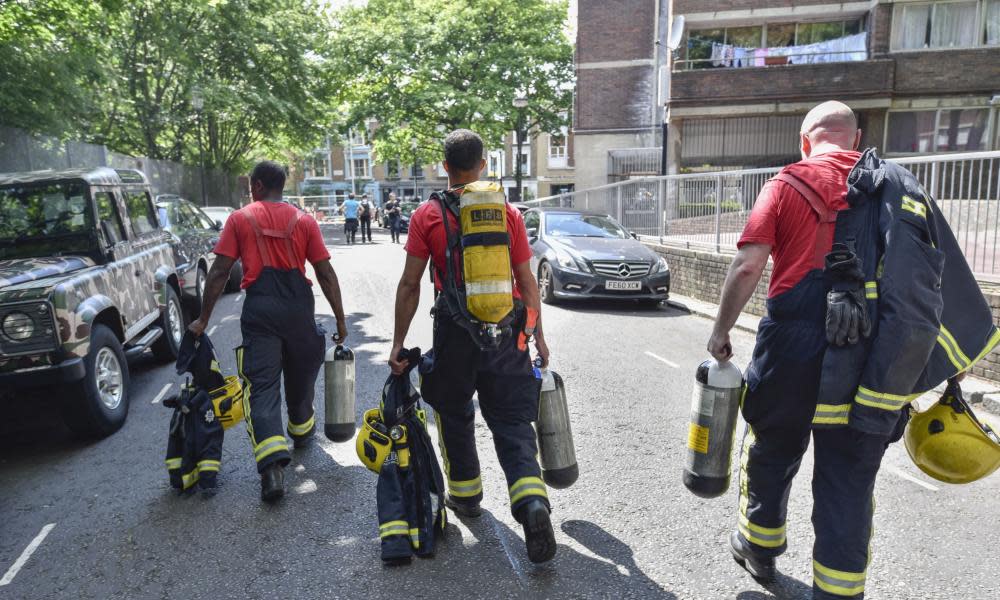Firefighters worry they are being 'stitched up' by Grenfell inquiry

Firefighters fear they are being “stitched up” in the Grenfell Tower inquiry because their role has already been heavily scrutinised yet conclusions about the fire’s causes are not likely to be drawn until at least three years after the disaster that claimed 72 lives.
Matt Wrack, the general secretary of the Fire Brigades Union, which is a core participant in the inquiry, claimed the process risked becoming a “whitewash” because ministers’ deregulation of building standards and the roles of companies involved in the tower’s £10m refurbishment will be addressed only when public interest has waned.
Wrack hit out as the inquiry chairman, Sir Martin Moore-Bick, drafts his findings about the fire service’s response to the blaze, which are due to be published after Easter. Some of the survivors have clashed with firefighters during evidence about rescue attempts and they branded the commissioner of the London fire brigade, Dany Cotton, “disrespectful” after she told the inquiry she would not change anything about the way the brigade responded.
Fresh allegations about fire service failures will be aired on Monday in a Channel 4 Dispatches documentary, which will examine whether the decision to maintain the “stay-put” policy cost lives. It will report that 55 of the people who died in the fire took advice from the fire brigade to remain in their flats, despite the blaze rapidly engulfing the building.
It will quote one firefighter who was at Grenfell, who spoke anonymously, as saying “we could have seen this coming” because of the brigade’s experience at Lakanal House in 2009, when six people died in a refurbished south London tower block as a result of fire breaching compartmentation between flats.
Several firefighters will be asked to give further evidence to the inquiry in the near future.
“The views I am expressing are being expressed more bluntly in fire stations, that this is in danger of turning into a stitch-up of firefighters,” said Wrack. “Even if they did or didn’t make mistakes, the only thing they did on the night was turn up to put a fire out and yet they are the people that have come under the most scrutiny so far.”
The second phase of the inquiry, dealing with the planning and decision-making involved in the refurbishment of Grenfell using combustible materials, might not start hearing witnesses until the beginning of next year. The inquiry has been deluged with about 200,000 documents from core participants, including the cladding manufacturer, Arconic, the contractor, Rydon, and the owner of the building, Kensington and Chelsea council.
“The stark, staring obvious problem is how can you wrap a building in flammable material like that?” said Wrack. “Everyone asked that within hours and yet we won’t even look at that in three years and before they start to reach conclusions on it it could quite easily be 2021. The order of business was wrong. Looking at the night before looking at the background was wrong. Before any 999 call was made the building was already a death trap. All of the safety arrangements had been compromised, but how we got to that stage we still don’t know.”
John Plant, the chief executive of Arconic, the £2.7bn turnover company that made the highly combustible polyethylene-filled aluminium cladding used on Grenfell, last week told reporters there were no “specific claims for compensation or anything like that coming from [the inquiry] and neither does the company believe that it was the cause of this incident”.
Its counsel to the inquiry has said it was “impossible to argue that ACM PE [the panels used] was non-compliant” with building regulations. Referring to Behailu Kebede, the resident of flat 16 where the fire started, he claimed: “A simple fire extinguisher in his hands would have made a big difference to the outcome.”
Wrack said: “By the time the inquiry looks at what are for us more fundamental issues, public and political interest will have waned and I don’t want to sound like a conspiracy theorist, but it is almost what some people would want. Deregulation, including of the fire service, should be at the heart of this debate and those are decisions that were made by ministers. Government ministers ultimately benefit from how things are playing out currently.”
He said: “While people go into this believing this will deliver justice, it may well not deliver justice at all.”
A spokesperson for the inquiry said: “The inquiry does not share the view that public interest in the devastating fire at Grenfell Tower will wane. The inquiry has been organised in a way that enables everyone to understand exactly what happened on 14 June 2017, so that in the next phase it is able to examine fully the circumstances and causes of the disaster. Disclosure to core participants of over 200,000 phase two documents relating to the refurbishment and other matters is already under way.”
A Cabinet Office spokesperson said: “The timetable for this work is a matter for the inquiry, which is independent of government. We are committed to ensuring we learn the lessons from the Grenfell Tower fire, so that it can never happen again.”

 Yahoo News
Yahoo News 
